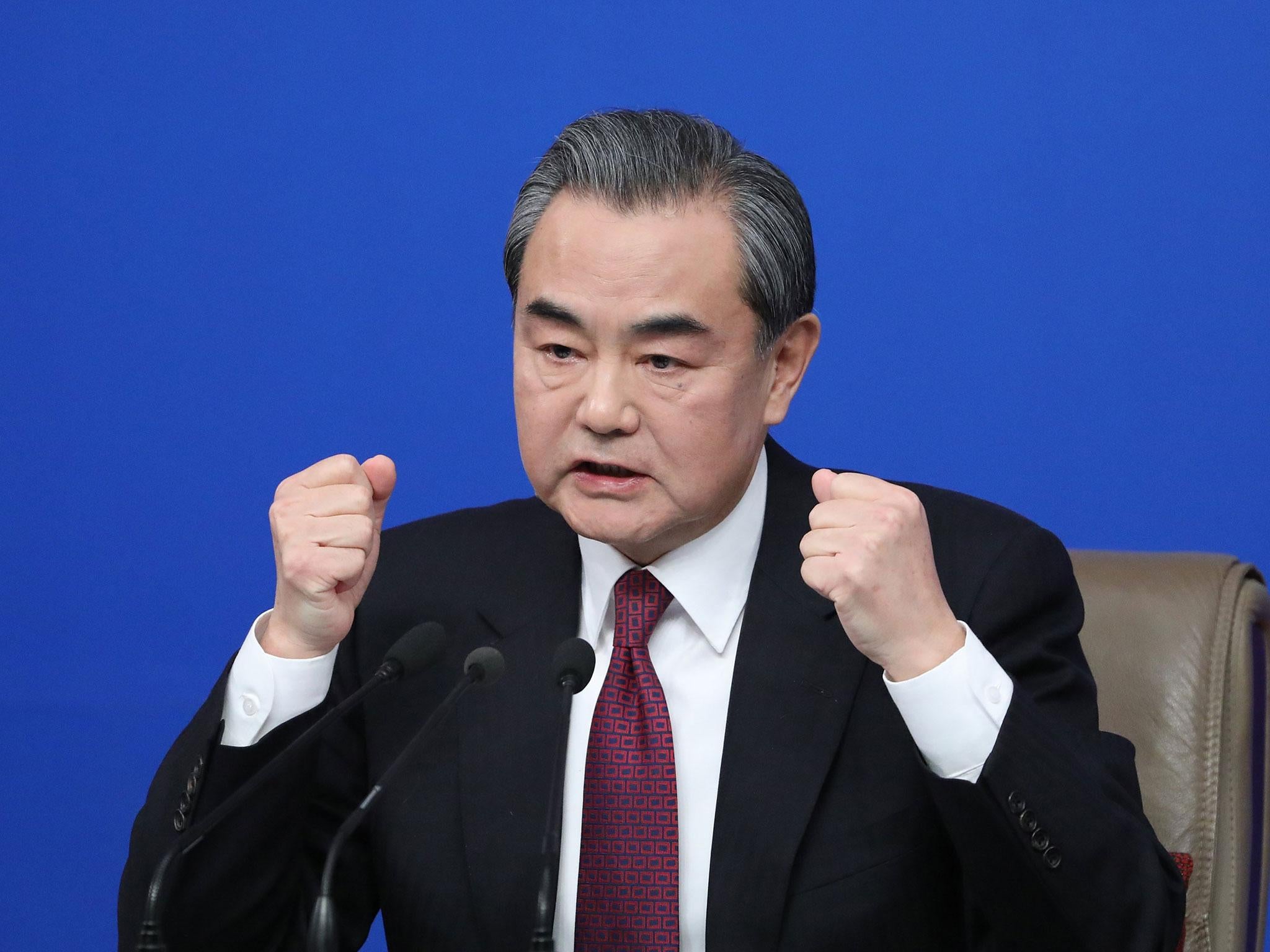China reveals plan to prevent 'head-on collision' between US and North Korea
Chinese foreign minister Wang Yi says North Korea must stop developing weapons and the US and the South must cease joint military drills

China’s foreign minister has a plan to ease tensions in East Asia: North Korea should stop testing missiles and the United States and South Korea should stop joint military exercises, he has said.
The comment was made at a news conference in Beijing two days after North Korea test-fired four missiles and the US and South Korea deployed a new missile defence system that Beijing opposes, raising regional tension and renewing questions about Asia policy under President Donald Trump.
“China’s suggestion is, as a first step, for North Korea to suspend nuclear activity, and for the US and South Korea to also suspend large-scale military drills,” said Wang Yi, the Chinese foreign minister. The plan could get all sides back to the negotiating table, he added.
Mr Wang likened the US and North Korea to trains at risk of collision. “The two sides are like two accelerating trains coming towards each other with neither side willing to give way,” he said.
“The question is: are the two sides really ready for a head-on collision? Our priority now is to flash the red light and apply the brakes on both trains.”
In his portrayal of the tensions in the region, China is the signalman working to avert disaster – not, as some US observers might have it, a conductor in its own right.
What Mr Wang proposed is not new – North Korea has pitched “suspension for suspension” many times and the US has balked.
However, this is the first time it has been raised under President Trump, presenting some new possibilities, said John Delury, an assistant professor at Seoul’s Yonsei University.
“We don’t know what Trump is going to do about North Korea,” he said. “There is a policy review underway now and it looks like all options are on the table.”
At the heart of all this is a question about Beijing’s role in the relationship between China, North Korea, South Korea, Japan and the United States, particularly as the US charts a new foreign policy under Mr Trump.
Last month, North Korea tested a solid-fuel rocket that it claims is part of an intercontinental ballistic missile capable of hitting the United States. The country was then linked to the assassination, in Malaysia, of ruler Kim Jong-un’s half brother, Kim Jong-nam, who had been under Chinese protection.
On Monday, as China’s National People’s Congress opened in Beijing and joint US-South Korea military exercises got underway, Pyongyang launched four missiles – target practice, it said.
All sides have condemned North Korea’s actions. What nobody can agree on is what to do next.
China says the conflict should be solved by the US and North Korea – the “speeding trains” themselves. But the US has long argued that the conflict cannot be solved without more help from China, North Korea’s last real ally.
North Korea and China were once as close as “lips and teeth”, Mao Zedong said. While they are still technically allies – Mr Wang resurrected Mao’s “lips and teeth” line today – China is frustrated by North Korea’s nuclear theatrics and exhausted by its economic woes.
After February’s rocket launch, Beijing closed loopholes in an existing effort to curb North Korean coal imports, a sector seen as a financial lifeline for the Kim regime.
Chinese experts insist that Beijing has few remaining options when it comes to Pyongyang, mostly because North Korea sees the development of its nuclear programme as the only way to protect against the US – they would rather have no coal, or no cash, than cease to exist, the theory goes.
“Even if China stops oil aid to North Korea, it will still not give up developing nuclear weapons,” said Yang Xiyu, a senior fellow at the China Institute of International Studies, in Beijing. “We cut off coal imports from North Korea and its economy was affected, however, North Korea can have nothing, and it will still believe it needs nuclear weapons to stop the US.”
Indeed, despite their many differences, Beijing and Pyongyang share a belief that the presence of US troops in South Korea is the root of regional conflict – a fact highlighted this week when China lashed out at the US and South Korea over the deployment of a new anti-missile system.
The US and South Korea say the Terminal High Altitude Area Defense (THAAD) system is necessary to shoot down North Korean missiles. China believes it could be used to spy on Chinese airspace and has called the project a “strategic plot”.

Though Mr Trump’s precise plans are unknown, the administration’s comments on North Korea so far suggest they think it’s up to China to play a bigger role. The THAAD deployment, however, could make it tougher to get them on board.
Experts said Mr Trump seemed unlikely, for now, to accept Mr Wang’s proposal. “There is very little possibility that they will get back to talks,” said Zhang Liangui, who studies North Korea at the Communist Party’s Central Party School.
That means the next move will likely come from Washington – and depend on Trump. “We just hope that the US can solve this,” Mr Zhang said.
© The Washington Post
Join our commenting forum
Join thought-provoking conversations, follow other Independent readers and see their replies
Comments
Bookmark popover
Removed from bookmarks